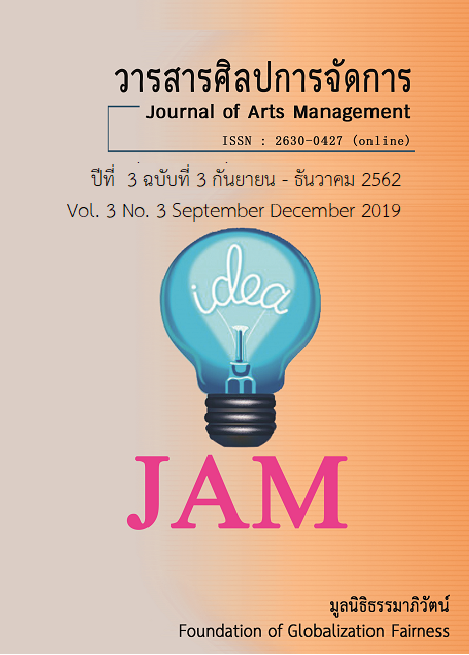Principles of the Fve Aspects of Natural Law with Ecology
Main Article Content
Abstract
This article aimed to present the five aspects of natural law and ecology. The five aspects of natural law are the law of absolute nature consisting of Physical laws, Biological laws, Psychic laws, and Moral laws. All definitions proceed according to all five rules. Another important issue is Dharma, which is a universal natural law that covers 4 sub-rules described above. Even though Buddhism is a study of Dharma and psychic law but does not deny physical law and biological law that are the focus of science The doctrines in Buddhism have inserted natural matters, such as the story of Dharma, which mentions all things to be in accordance with the cause and effect which summed up all the definitions together, all the above 4 definitions included in this dharma, the dharma rule, is a big rule that covers all the four definitions of the above, as a sub-rule relating to a particular subject has a relationship for example human beings that are virtuous in accordance with ethical principles must have morality which is to apply the knowledge that exists in nature and apply the laws to everyday life.
Article Details
Views and opinions appearing in articles in the Journal of Arts of Management It is the responsibility of the author of the article. and does not constitute the view and responsibility of the editorial team I agree that the article is copyright of the Arts and Management Journal.
References
พระพรหมคุณาภรณ์ (ป.อ.ปยุตฺโต). (2551). พจนานุกรมพุทธศาสน์ ฉบับประมวลศัพท์. (พิมพ์ครั้งที่ 11). กรุงเทพฯ: บริษัท เอส. อาร์. พริ้นติ้ง แมส โปรดักส์ จำกัด,
พระพรหมคุณาภรณ์ (ป.อ.ปยุตฺโต). (2558). พุทธธรรม ฉบับปรับขยาย. (พิมพ์ครั้งที่ 42). กรุงเทพฯ: มหาจุฬาลงกรณราชวิทยาลัย.
พระพรหมคุณาภรณ์ (ป.อ.ปยุตฺโต). (2559). พจนานุกรมพุทธศาสตร์ ฉบับประมวลธรรม. (พิมพ์ครั้งที่ 34). กรุงเทพฯ : บริษัท เอส.อาร์ พริ้นติ้ง แมส โปรดักส์ จำกัด.
พระพรหมบัณฑิต (ประยูร ธมฺมจิตฺโต). (2555). พระพุทธศาสนากับฟิสิกส์ควอนตัม : ความเหมือนที่แตกต่าง. กรุงเทพฯ: โรงพิมพ์มหาจุฬาลงกรณราชวิทยาลัย.
พุทธทาสภิกขุ. (2556). ทำดีได้ดี ทำชั่วได้ชั่ว ชุมนุมข้อคิดอิสระ. (พิมพ์ครั้งที่ 6). กรุงเทพฯ: โรงพิมพ์ตถตา พับลิเคชั่น จำกัด.
พุทธทาสภิกขุ. (2533). พุทธศาสนิกกับการอนุรักษ์ธรรมชาติ. กรุงเทพฯ: มูลนิธิโกมลคีมทอง.
มหาจุฬาลงกรณราชวิทยาลัย. (2539). พระไตรปิฎกภาษาไทย ฉบับมหาจุฬาลงกรณราชวิทยาลัย.กรุงเทพฯ: โรงพิมพ์มหาจุฬาลงราชวิทยาลัย.
มหาจุฬาลงกรณราชวิทยาลัย. (2560). อรรถกถาพระไตรปิฎก พระอภิธรรมปิฎก อัฏฐสาลินี. กรุงเทพฯ: โรงพิมพ์มหาจุฬาลงราชวิทยาลัย.
ราชบัณฑิตยสถาน. (2546). พจนานุกรม ฉบับราชบัณฑิตยสถาน พ.ศ. 2542. กรุงเทพฯ: บริษัทนานมีบุ๊คส์พับลิเคชั่นส์ จำกัด.
สมภาร พรมทา. (2540). พระพุทธศาสนากับวิทยาศาสตร์. (พิมพ์ครั้งที่ 2). กรุงเทพฯ: สำนักพิมพ์แห่งจุฬาลงกรณ์มหาวิทยาลัย.
สม สุจีรา. (2553). เกิดเพราะกรรมหรือความซวย. กรุงเทพฯ: อมรินทร์.
De Silva,The Hills Where in My Soul Delights.(1992).In Buddhist and Ecology. Varansi: Motilal Banaradidass.


